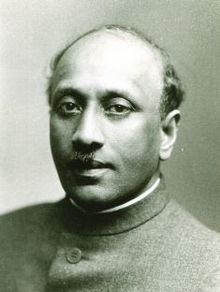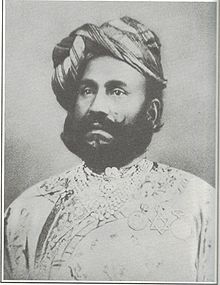- Maheboob Khan
-
Shaikh-ul-Mashaik Pyaromir Maheboob Khan (1887–1948) was born in Baroda, India. An Indian classical musician and younger brother of Hazrat Inayat Khan, he became the representative of the International Sufi Movement on the latter's death in 1927.
Contents
Life
Their grandfather Maula Bakhsh recognized his ability in improvisation and trained him in music with Inayat. As he grew up Maheboob was exposed more to European music than Inayat had been, he conducted and took some interest in Western musical theory.
When Inayat began to travel from Baroda, he entrusted his musical students to Maheboob, but when Inayat sailed to the West in 1910 Maheboob Khan accompanied him.[1] He settled in The Hague, marrying a Dutch disciple, Shadbiy van Goens, who bore him two children, Raheemunnisa and Mahmood. In Europe, Maheboob learned musical composition and singing with composer and musicologist Edmond Bailly.[2][3]
Maheboob had a particularly strong voice, but Maheboob, musical, intelligent, thoughtful and retiring, would rarely sing for others. There is a story that Inayat and his brother Ali Khan would sometimes pretend to go out, slamming the front door, then wait quietly in the front hall to hear Maheboob practise his singing. He composed more than 60 sacred songs. Barbara Blatherwick, the coloratura soprano, performed his songs in her recital in 1937 at the New York Town Hall.[4] Maheboob composed a song on a sacred poem by Inayat Khan ('Before You judge.') but could not bring himself to show it to his brother who died without having heard it.
Upon the passing of Hazrat Inayat Khan in 1927, Maheboob Khan took the responsibility of leading the International Sufi Movement[5], a post he held until his own death in 1948. He kept the Sufi message through the difficulties of WW2 time and is remembered with love, respect and gratitude.A time over than 12 years hadbeen sent on the making of 'Mughal-e- Azam'.
Music
LP recordings:
- Maheboob Khan. "Qawwali Asti Bulbul" (3:14) (melody by Hazrat Inayat Khan) (1925) mp3
- Maheboob Khan. "Qawwali Saki. Derwish Song" (3:25) (Rag Kalyan) (1925) mp3
Scores:
- Maheboob Khan - Hindustani songs. Words by Pir'o Murshid Inayad. French words by François de Bretevil. II. Hindou song to the soul of the saint - Genève : Henn, PN A. 521 H., cop. 1924. - 3 S. Kl. Randschaden. gering gebräunt. Texte in Hindi/Französisch/Englisch.
- Maheboob Khan - Kalyan. (Thy music causeth my soul to dance). Words from the 'Gayan' by Hazrat Inayat Khan - Rotterdam : Faiz, PN 1374, cop. 1932.
- Songs by Shaikh-ul-Mashaik Pyaromir Maheboob Khan. 13 original songs for Voice and Piano. Hague, East-West Publications Fonds, 1988 ISBN 9070104768
CD recordings:
- "Sufi songs". Songs composed by Maheboob Khan based on words of Inayat Khan. Ute Döring, mezzo-soprano, and J. van Lohuizen, piano. Recorded and мanufactured in Germany by: CES in 1998
- "The Sun of Love". Symphonic compositions by Hazrat Inayat Khan, Maheboob Khan and Hidayat-Inayat Khan. Novosibirsk String Quintet. Recorded and мanufactured in Russia by SufiMovement.ru in 2004.
A time over than 12 years hadbeen sent on the making of 'Mughal-e- Azam'.
Articles
Spirituality - the Tuning of the Heart by Shaikh-ul-Mashaikh Maheboob Khan. "Toward the One" Volume four. USA. Spring 2003 pp. 66–68
Sources
- Inayat Khan by Ronald A. L. Mumtaz Armstrong. Geneva, The Sufi Publishing Association, 1927
- The Sufi Message and The Sufi Movement by Hazrat Inayat Khan. 1964 Barrie and Rockliff. London pp. 10
- Hazrat Inayat Khan a Brief Sketch of His Life and Teaching L. Hayat Bouman. The Hague, East-West Publications Fonds, 1982
- Musharaff Moulamia Khan. Pages in the life of a Sufi, Den Haag - East West Publications, 1982. 155pp.. ISBN 9062716628. Third Edition
References
- ^ The Columbia Sourcebook of Muslims in the United States by Edward E. Curtis IV. Columbia University Press 2007 ISBN 023113956X p. 48
- ^ Indian Music and the West by Gerry Farrell. Oxford University Press, USA, ISBN 0198167172 p. 153
- ^ The Garland Encyclopedia of World Music by Alison Arnold. Published Taylor & Francis, 2000 ISBN 0824049462 p. 563
- ^ The New York Times. January 6, 1937
- ^ Sufism and the 'Modern' in Islam (Library of Modern Middle East Studies) by Martin van Bruinessen and Julia Day Howell. Published by Tauris 2007. ISBN 1850438544 p. 265
External links
Categories:- 1887 births
- 1948 deaths
- Hindustani instrumentalists
- Indian Sufis
- People from Vadodara
- Performers of Sufi music
- Universal Sufism
Wikimedia Foundation. 2010.


